News
Community Plans Ways to Empower Students Through Science at the “Health in Our Hands Kickoff”
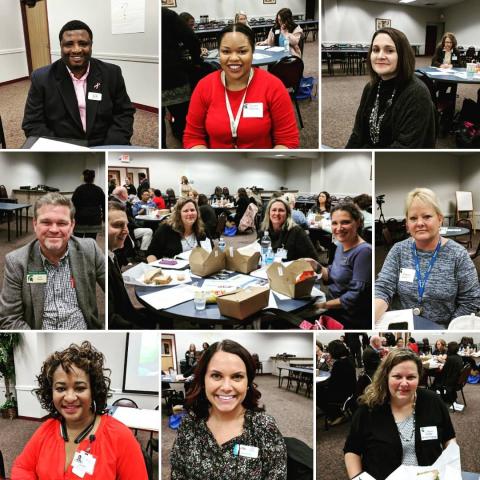
A concerned and caring community came together this past week from organizations representing health, education and community to support the young people of Flint and beyond. On Wednesday October 24th, a new community coalition, Health in Our Hands-Flint/Genesee Partnership, highlighted an innovative project-based science curriculum, which links the classroom to the community. The group then shared ideas and ways to collaborate to support the success of the Health In Our Hands curriculum in Flint-area schools after the grant-funded program ends.
“Our common goal is to support kids in our community and connect them with the resources they need, “ commented Mary Herman from Representative Dan Kildee’s Office in her opening remarks.
Over the past 3 years, Health in Our Hands has been enacted in 6-8th grade classrooms in Flint-area schools with over 1400 students. “This project excites me more than most other projects that I have been a part of in my career as a science consultant,” said James Emmerling, Oakland County Intermediate School District. “They aren’t just learning science facts, like you and I may have been taught – the kids actually learn science, by doing science. They are truly engaged in their own learning, because it connects to them on a personal level through diseases that touch their lives either directly or indirectly.”
Using diabetes and addiction as real-world contexts, students put to use modern concepts in genetics and environmental health to address health concerns relevant to their lives and take action to improve their community. Student learning is empowered by working with health related classroom mentors to engage them in community health research and introduce them to potential career interests.
“Although this project is based in theory it has a practical application that our young people have taken to the next level,” said Omar Sims, Executive Community Liaison of Health Alliance Plan. Students present their results and recommendations at a health summit, giving them the opportunity to see themselves in the role of these careers by communicating real scientific research at a middle school level.
“We are now beginning an exciting new phase of this project, with community health and education partners assuming ownership of the program and committing themselves to supporting its future growth and to providing our students with expanded year-round opportunities applying their science learning to research and advocacy in the community,” said Toby Citrin, Director, Center for Public Health and Community Genomics, at the University of Michigan School of Public Health.
Health in Our Hands, funded by NIH-Science Education Partnership Award (SEPA), is lead by Michigan State University-CREATE for STEM Institute. The kickoff event was organized by the Health in Our Hands-Flint/Genesee Partnership, a coalition of community, health, and education organizations dedicated to achieving success and sustainability of Health In Our Hands in Flint and beyond. Partnership members include Community Based Organization Partners of Flint, Flint Community Schools, Genesee Intermediate School District, Genesys Health System, Greater Flint Health Coalition, Health Alliance Plan, Michigan State University-CREATE for STEM Institute & Extension, University of Michigan-Flint Discovering Place, and University of Michigan School of Public Health.
Pilot testing of new unit begins with 7th Graders at Carman-Ainsworth Middle School
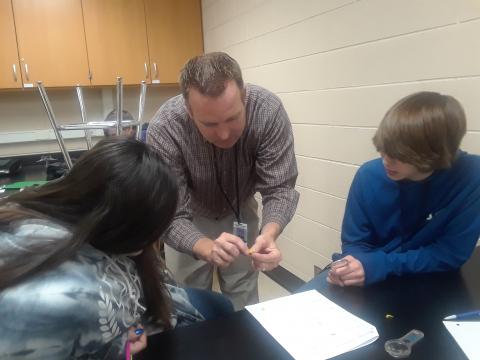
How can looking for thrills make me miserable? This is the question 145 7th-graders at Carman-Ainsworth Middle School are investigating in science class. Pilot testing began April 12th and curriculum design continues in partnership with science teacher, Adam Cassel. This second unit dives deeper into gene-environment interactions exploring genetics, mutation, natural selection and evolution. Students investigate the brain’s reward system and why this system can lead to addictive behavior. The unit starts with a video with teens’ testimonials about their addiction to vaping (e-cigarettes), a concerning trend among high school and some middle school students. This leads into a discussion about addiction more broadly and how our genetics and the environment affect our risk. Finally, they research, “What can we do to reduce the risk for addictions for ourselves and in our community?”
Public Health Student Team Motivate Students Through Multi Media Messaging
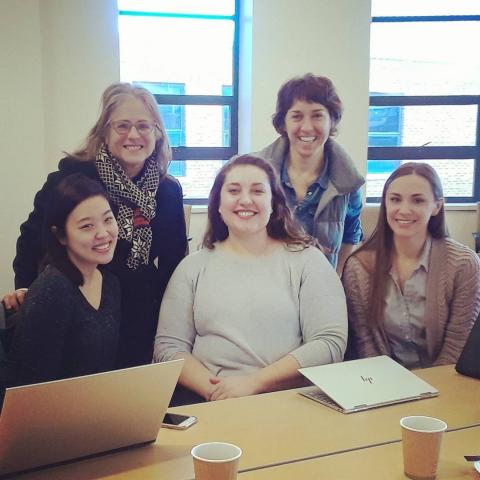
Meet Dr Sofia Ortega who works at Healthville Hospital! This is one of three videos was created by a wonderful team of University of Michigan School of Public Health graduate students Allison Seelye, Minji King and Amelia Schmid as part of their course requirements. It will be used in the 6th grade unit to motivate the students and help them set goals as they engage in the community action projects. The student team also created videos about college student, JJ, and the Mayor of Healthville. Congratulations to the team, which won first prize in their class contest!
Health in Our Hands at the MSU Science Festival in Detroit
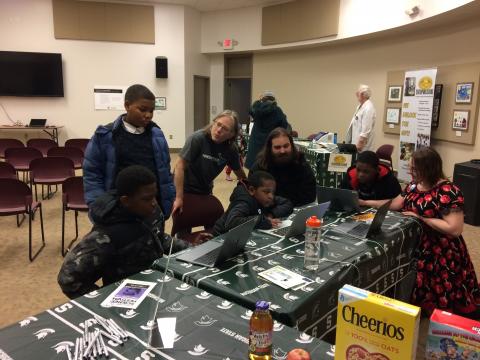
CREATE for STEM Institute staff and volunteers presented at the Michigan State University Science Festival on Sunday April 15th to share information about diabetes with families in Detroit. Children used the online simulation from the Health in Our Hands middle school curriculum to plan and carry out an investigation about diabetes. The game uses simulated sand rats that can contract diabetes when fed sugary lab food. Using the simulation, users can ask a question, identify sand rats by gender and genetic risk for diabetes, place rats in pens, and feed them sugary lab food or native plants. They can see the results in real time and analyze the data to answer their questions. The Sand Rat Simulation was developed by the Concord Consortium and curriculum developers as part of the project, "A New Genomic Framework for Schools and Communities" funded by the Science Education Partnership Award - National Institutes of Health.
Sixth Graders Use Science to Improve Community Health
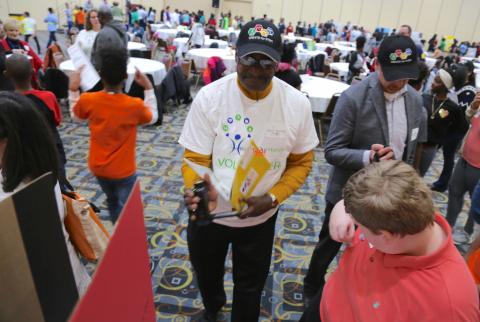
Submitted by Renee Bayer on December 15, 2017 - 2:27pm
On Tuesday, December 12, 2017, two hundred 6th graders from six Flint Community Schools gathered to share the results of their community action projects with their peers and community at the Riverfront Banquet Center. The students have been studying Type 2 diabetes in science class as part of a new curriculum called, “Health in Our Hands: What Controls My Health?” Through their studies, students discover how genetic risk factors and environmental factors, such as poor diet or lack of exercise, put them at risk for disease.
For their final projects, students conducted an action research project to improve their school or neighborhood to help prevent or reduce diabetes. Students worked collaboratively to answer the question, “How can we work together to make our community healthier?” Each class chose a different inquiry question to research and used a variety of data collection methods to draw conclusions and develop suggestions for community health improvement often collaborating with researchers to conduct cutting edge research.
At Freeman School, Mrs. Savoie’s classes worked with Rick Sadler, professor of public health at Michigan State University (MSU), to answer their question, “How does my neighborhood affect my exercise and walking habits?” Students used GPS to track their movements to look for patterns in activity and discuss barriers to exercise. "We discovered that 55.45% of our students in Freeman don't want to walk because of stranger danger," said Timari Brown.
Several classes investigated strategies for healthy eating with MSU nutritionists Dr. Katherine Alaimo and Nick Drzal. Mr. Sutton’s class at Durant-Tuuri-Mott measured processed and unprocessed food in their diets. Ms. Seelye’s class at Doyle-Ryder studied reasons for food waste in the cafeteria. Two classes at Potter, Mr. Lafferty’s and Mrs. Christian’s, investigated how marketing strategies can encourage healthier eating and less food waste in school. Similarly Mrs. McClendon’s class examined how raising awareness to the consequences of unhealthy foods affects students’ eating habits.
At the Final Presentations, students presented their results to their peers and to “judges” from university and community groups. Judges commented about how knowledgeable, enthusiastic and well prepared the students were. They were impressed with the variety of research projects and data collection methods leading to consistent messages about healthy eating and exercise. Students gathered to listen to Dr. Woody Neighbors from the College of Medicine at MSU who shared thoughts on careers in medicine, public health and research. The students were welcomed by Shawn Merriwether, Assistant Superintendent of Flint Community Schools. They listened to a panel of their peers facilitated by Sharon Saddler from Community-Based Organization Partners of Flint. They also heard an original rap song composed and performed by Kesaan Bonner, a 6th grader from Mrs. Sparks class at Holmes STEM Academy.
The event was covered by local television and print. Local television abc12 highlighted the role of science in improving students’ schools and neighborhoods. The East Village Magazine described the promise of project-based learning for Flint students.
“Health in Our Hands: What Controls My Health” is a research project led by the CREATE for STEM Institute at Michigan State University in partnership with Flint Community Schools, the University of Michigan School of Public Health, Community-based Organization Partners of Flint, the Sloan Museum, the Flint Public Library, Concord Consortium in Massachusetts and multiple partners in Detroit. The project is funded by the National Institutes of Health through their Science Education Partnership Awards (SEPA).


